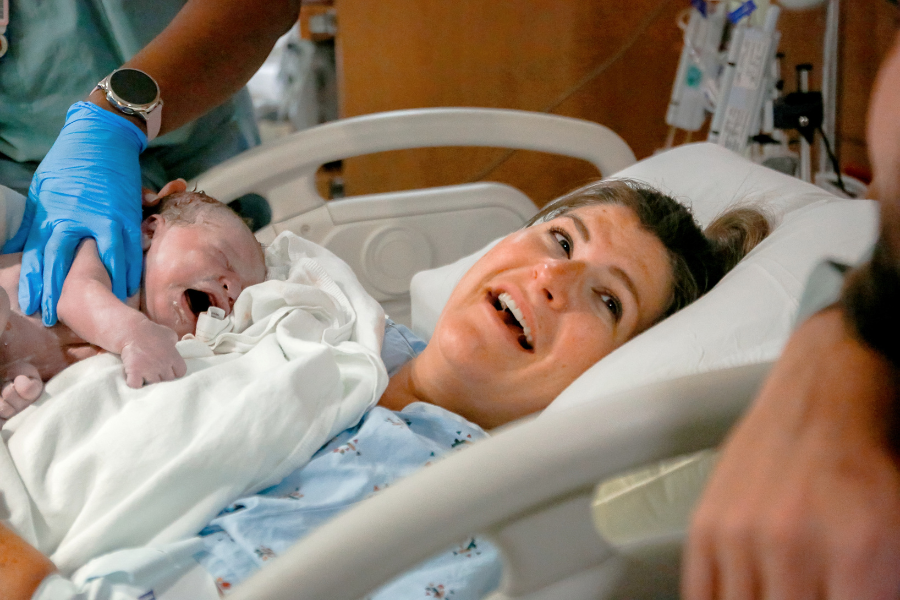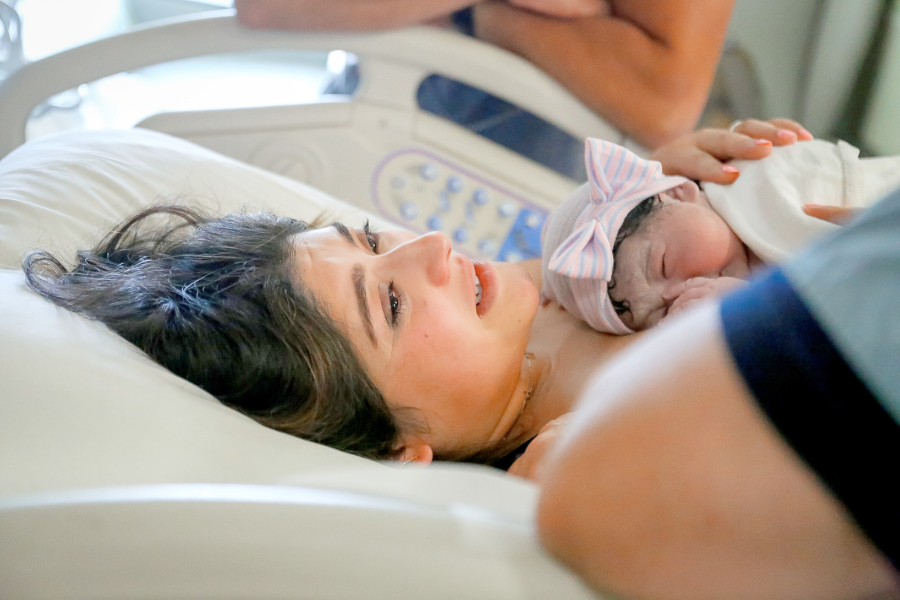Pregnancy – a conglomeration of feelings and emotions! Happy and excited, overwhelmed and anxious, and exhausted and uncomfortable. My guess is that you will feel many, (if not all!) of these things at some point during your pregnancy.
Exhaustion and discomfort are two fairly common ways to describe pregnancy. But if pregnancy is so taxing on your body, how do you know if and when you should stop working during pregnancy?
Today I’m going to unpack 5 (give or take) signs to stop working during pregnancy. Typically this is a decision that is made in conjunction with your OB provider, but these are at least some things to be on the lookout for.
Ready? Let’s go!
Follow @mommy.labornurse on Instagram to join our community of over 650k for education, tips, and solidarity on all things pregnancy, birth, and postpartum!
When should I stop working during pregnancy?
Let me begin by saying that the majority of women have no issue working throughout their pregnancy – right up to their due date!
The most common exceptions are the jobs out there that are very labor intensive, or when complications surface during pregnancy that might warrant stopping work earlier.
What’s more, a lot of workplaces (not all, believe me, I’ve heard stories!) are pretty accommodating to pregnant employees. They might have the ability to temporarily tweak the person’s job responsibilities and/or environment to allow them to continue working without potential risks.
And unfortunately, there are those companies that either cannot or will not accommodate. I will not go into the legal side of this, primarily because, well, I’m a nurse and not a lawyer, but there are also laws in place to protect pregnant women in the workplace.
But speaking of lawyers, I have a podcast episode I recorded with the wonderful Daphne Delvaux (aka @themamattorney) that can help you with this! This episode is worth your time, especially if you are a pregnant or postpartum mama!
Related Listening: Episode 181: Pregnancy and Postpartum Rights in the Workplace with Daphne Delvaux
Signs to stop working during pregnancy
Let’s review some more general signs that it might be time to stop working during pregnancy.
Obviously every person and pregnancy is different so please don’t heed this as medical advice for you specifically.
Prior to making a decision, I recommend having a conversation with your OB provider!
1. Signs of preterm labor
- Abdominal cramping, pain, or pressure
- Pelvic pressure
- Constant low, dull back pain
- Change in type of discharge (watery, bloody, mucus)
Some women are at an increased risk for preterm labor due to cervical insufficiency (one of those medical terms that I don’t love).
According to ACOG, “sometimes the cervix isn’t strong enough to stay closed as the pregnancy grows. This weakness is called cervical insufficiency.” (source)
Depending on the physical demands of your job, it might be safest to take time off work if you experience cervical insufficiency or preterm labor during your pregnancy.
2. Signs of preeclampsia
- Headache unrelieved by medication
- Seeing spots, blurry vision, or other visual changes
- Pain in the upper abdomen or shoulder
- Sudden weight gain
- Swelling of the face or hands
- Shortness of breath
To be clear, I am not saying everyone with preeclampsia should stop working! Preeclampsia ranges in severity from mild to severe.
Mild preeclampsia can usually be managed by monitoring blood pressure and symptoms from home, possibly with some medication.
More severe preeclampsia might land you in the hospital for closer observation and even early delivery, which likely means no more working.
3. Persistent vaginal bleeding
Not all vaginal bleeding will require you to stop working, but there are some situations that might cause you to at least take a work break.
Vaginal bleeding in pregnancy can be caused by a lot of different things, some more concerning than others.
It is always recommended to promptly reach out to your provider or visit the closest emergency department (if unable to reach your OB provider) if you experience bleeding during your pregnancy.
4. Intense fatigue
Don’t get me wrong, pregnancy is exhausting! Growing a human is hard work and can be straining – physically, mentally, and emotionally!
But some jobs are more physically demanding than others so depending on your line of work, you might need to stop working sooner than others.
5. Severe anxiety or depression
In addition to being exhausting, pregnancy can also be overwhelming and stressful. If anxiety or depression is something you struggle with prior to pregnancy, there’s a good chance it will impact you during and/or after pregnancy as well.
For some women, the anxiety or depression during pregnancy is overwhelming to the point where they are not able to continue working.
As someone who suffered with postpartum anxiety, I know all too well how debilitating mental health disorders can be. For some helpful (and natural) ways to cope with anxiety during pregnancy, be sure to read my article below!
Related Reading: Natural Remedies for Anxiety During Pregnancy
How to take time off during pregnancy
Maybe you are experiencing some of the above signs, or maybe you need time off for other reasons. There are a few ways you can go about taking time off during pregnancy.
And again, I’m a labor nurse, not a labor attorney. So I won’t get into the nitty gritty details, but wanted to at least put it on your radar.
FMLA
The Family and Medical Leave Act (more commonly known as FMLA) protects an eligible employee’s job should they require time off for medical reasons.
Aside from ensuring continuation of existing health insurance benefits, FMLA doesn’t actually have anything to do with financial compensation. The U.S. Department of Labor website explains it much better and in more detail than I can, so definitely take a peek at their website here.
Short-term disability
Another potential option is short-term disability. Unlike FMLA, short-term disability is an income replacement benefit. Varying based on your employer and the state in which you live, short-term disability typically covers a percentage of your base pay while you are out on a disability claim.
It can get a little confusing, and honestly, it took me going through the actual process (when I was preparing for maternity leave) to get a grasp on it. And keep in mind, short-term disability is a benefit that you need to opt into, it is not something that is automatically provided to you.
As I said, short-term disability coverage varies a decent amount from state to state and employer to employer. I recommend getting on the phone with your insurance company and/or benefits department, either early in pregnancy or prior to getting pregnant, and asking exactly what yours covers.
Be sure to ask what percentage of your base pay is covered, how long coverage lasts, and if there is any amount of processing or waiting period before it kicks in.
More resources related to the Pregnancy Discrimination Act
There’s actually something called the Pregnancy Discrimination Act that protects pregnant women from being discriminated against in the workplace.
I mentioned her previously, but Daphne Delvaux with The MAMAttorney is a wealth of knowledge when it comes to protecting your rights as a mama or soon-to-be mama!
You can also reference the U.S. Department of Labor’s website for more information about the Pregnancy Discrimination Act and other laws, regulations, and resources regarding mama’s rights in the workplace!
Cheers to an even better birth, mama!
And while you’re here, be sure to check out these additional resources from MLN:





